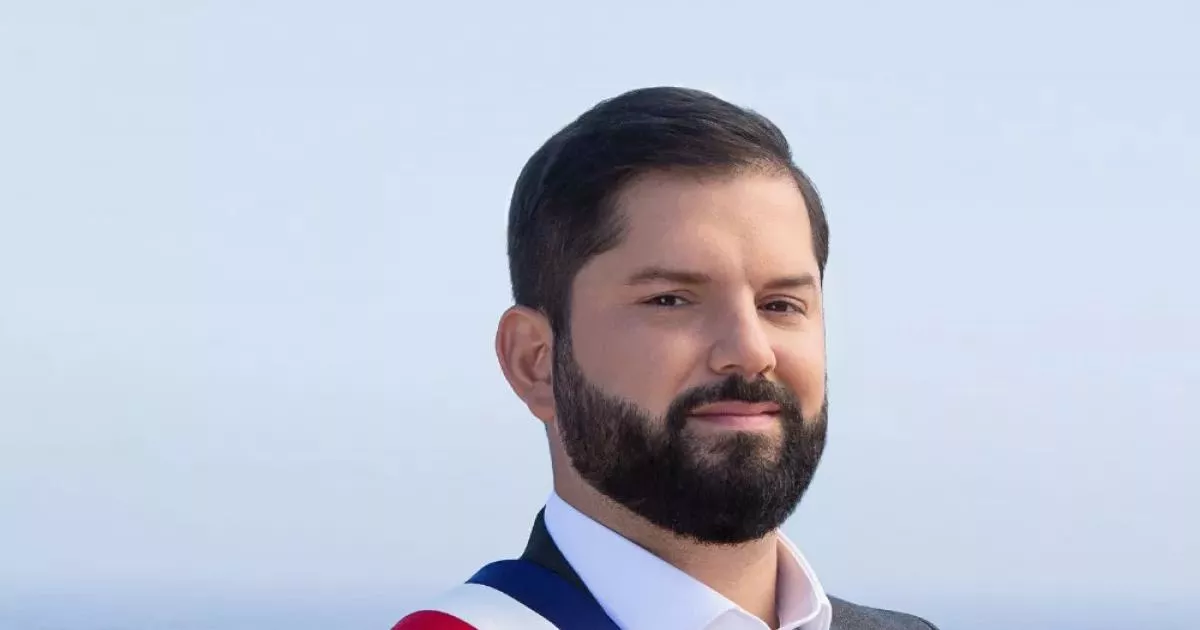Gabriel Boric Font is a Chilean politician who has served as the President of Chile since March 2022. Prior to his presidency, he was a two-term deputy in the Chamber of Deputies, marking his earlier involvement in Chilean politics.
1908: Birth of Grandfather Luis Boric Crnosija
In 1908, Luis Boric Crnosija, Gabriel Boric's grandfather, was born. He was one of the ten children of Juan Boric and Natalia Crnosija who were born in Magallanes after migrating from Croatia.
1980: Granduncle Wins National Prize for Literature
In 1980, Roque Esteban Scarpa, Gabriel Boric's granduncle, won the Chilean National Prize for Literature.
February 1986: Gabriel Boric Born
In February 1986, Gabriel Boric Font was born. He is now a Chilean politician and the President of Chile since March 2022.
1986: Born in Punta Arenas
In 1986, Gabriel Boric was born in Punta Arenas, Chile. He has two brothers, Simón and Tomás.
1999: Re-established Federation of Secondary School Students
In 1999, Gabriel Boric played an active role in re-establishing the Federation of Secondary School Students of Punta Arenas.
2000: Continued Role in Federation of Secondary School Students
In 2000, Gabriel Boric continued his active role in re-establishing the Federation of Secondary School Students of Punta Arenas.
2004: Moved to Santiago to Attend Law School
In 2004, Gabriel Boric moved to Santiago to attend law school at the University of Chile after attending The British School in his hometown.
2008: Advisor to Students' Union of the Law Department
In 2008, Gabriel Boric served as an advisor to the Students' Union of the Law Department.
2009: Assumed Presidency of Students' Union
In 2009, Gabriel Boric assumed the presidency of the Students' Union and led a 44-day protest against the dean, Roberto Nahum.
2009: Appointed President of Law School Students' Union
In 2009, Gabriel Boric completed his coursework and was appointed as the President of the Law School students' union at the University of Chile.
2010: Represented Students as University Senator
From 2010, Gabriel Boric represented students as a university senator.
December 2011: Elected President of FECh
In December 2011, Gabriel Boric was elected President of the University of Chile Student Federation (FECh), defeating Camila Vallejo.
2011: Failed Law Exam
In 2011, Gabriel Boric did not pass the law exam and chose not to retake it, thus not obtaining a law degree.
2011: Led Student Protests
In 2011, Gabriel Boric rose to prominence as a student leader at the University of Chile, leading its student federation during the student protests.
2012: Represented Students as University Senator
In 2012, Gabriel Boric continued to represent students as a university senator.
2012: Named one of 100 Young Leaders
In 2012, Gabriel Boric was featured on the list of 100 young leaders of Chile by El Sábado magazine and Adolfo Ibáñez University.
2013: Parliamentary Elections
Gabriel Boric participated in the 2013 parliamentary elections for deputy of District 60 (Río Verde, Antártica, Laguna Blanca, Natales, Cabo de Hornos, Porvenir, Primavera, Punta Arenas, San Gregorio, Timaukel and Torres del Paine)
2013: Ran as an Independent Candidate
In 2013, Gabriel Boric ran as an independent candidate, representing Magallanes, his home region.
2013: Elected to Parliament
In 2013, Gabriel Boric was elected to parliament as an independent candidate for District 60, representing the Magallanes Region.
March 2014: Sworn in as Member of Chamber of Deputies
On 11 March 2014, Gabriel Boric was sworn in as a member of the Chamber of Deputies.
2014: Served in the Chamber of Deputies
In 2014, Gabriel Boric began serving in the Chamber of Deputies, representing the Magallanes region.
2014: Controversy over attire in Chamber of Deputies
In 2014, controversy arose when Gabriel Boric entered the Chamber of Deputies without wearing a tie or formal jacket, prompting a public complaint from a right-wing deputy.
2016: Boric defends probation program for convicts in Valparaíso
In 2016, Boric defended a program to put 400 convicts in Valparaíso on probation due to overcrowding in Chilean prisons, criticizing penal populism.
2016: Autonomous Left Disbanded; Autonomist Movement Founded
In 2016, the Autonomous Left disbanded, leading Gabriel Boric and his allies to found the Autonomist Movement, aiming for a new leftist coalition.
January 2017: Launched the Chilean Broad Front
In January 2017, Gabriel Boric's movement launched the Chilean Broad Front (Frente Amplio).
2017: Parliamentary Elections
Gabriel Boric participated in the 2017 parliamentary elections for deputy of District 28 (Río Verde, Antártica, Laguna Blanca, Natales, Cabo de Hornos, Porvenir, Primavera, Punta Arenas, San Gregorio, Timaukel and Torres del Paine)
2017: Part of the Broad Front Coalition
In 2017, Gabriel Boric ran as part of the Broad Front coalition.
2017: Sought Re-election as Independent Candidate
In 2017, Gabriel Boric sought re-election as an independent candidate supported by the Humanist Party, one of the founding members of the Broad Front, and increased his votes compared to 2013.
2017: Broad Front Performance in Elections
In 2017, the Broad Front had a commendable performance in the elections, becoming Chile's third largest political force.
2018: Founded Social Convergence Party
In 2018, Gabriel Boric founded the Social Convergence party, a constituent of the Broad Front.
2018: Leave of Absence from Congress
In 2018, Gabriel Boric took a leave of absence from Congress after being hospitalized due to his obsessive–compulsive disorder.
2018: Autonomist Movement Merged to Form Social Convergence
In 2018, the Autonomist Movement merged with other movements to establish the Social Convergence political party.
October 2019: Social Outburst Protests
On 18 October 2019, protests against increased tariffs in Santiago's transport system sparked the Estallido social, the largest civil unrest since the end of the military dictatorship.
November 2019: Signed Agreement for Social Peace and New Constitution
On 15 November 2019, Gabriel Boric signed the "Agreement for Social Peace and the New Constitution" as an individual, leading to controversy and resignations from his party.
2019: Negotiated Agreement for Constitutional Referendum
During the 2019 civil unrest in Chile, Gabriel Boric played a key role in negotiating the agreement that led to the October 2020 constitutional referendum.
2019: Relationship with Irina Karamanos
Gabriel Boric was in a relationship with anthropologist and sociologist Irina Karamanos between 2019 and 2023.
2019: Call to Return Occupied Territories
In 2019, after receiving a gift from the Jewish Community of Chile, Gabriel Boric called for Israel to return the occupied Palestinian territories in a tweet, describing Israel as a "genocidal and murderous state."
October 2020: Constitutional Referendum
In October 2020, Gabriel Boric negotiated the agreement that led to the constitutional referendum.
May 2021: Elections
In May 2021, elections were held, which included mayors, regional governors, and members of the Constitutional Convention.
July 2021: Won Apruebo Dignidad Primary Election
On 19 July 2021, Gabriel Boric won the Apruebo Dignidad primary election with 60.4% of the votes.
October 2021: Bill to Prohibit Import of Products from Israeli Settlements
In October 2021, Gabriel Boric and other deputies introduced a bill to prohibit the import of products originating from Israeli settlements, which are considered illegal by the international community.
November 2021: Competitive Option for General Election
In November 2021, Apruebo Dignidad positioned itself as a competitive option for the general election.
November 2021: First Round of Presidential Election
In November 2021, Gabriel Boric obtained 25.82% of the vote in the first round of the presidential election, placing second behind José Antonio Kast.
December 2021: Boric criticizes Bolsonaro
In December 2021, Boric criticized Brazilian President Jair Bolsonaro and Bolsonaro's stance regarding the crimes committed during Brazil's military dictatorship from 1964 to 1985. He referred to Bolsonaro as "a danger to the environment and humanity."
December 2021: Elected President of Chile
In December 2021, Gabriel Boric won the presidential election against José Antonio Kast, becoming the youngest president in Chilean history.
2021: Boric pledges to restrict forestry companies
Boric pledged in 2021 to impose restrictions on large forestry companies during his presidency.
2021: Boric criticizes penal populism in Apruebo Dignidad primaries
During a debate in the 2021 Apruebo Dignidad primaries, Boric once again criticized the shortcomings of penal populism in providing effective solutions.
2021: Boric pledges to dismantle Chile's neoliberal economic model
During the 2021 election, Boric pledged to dismantle the country's neoliberal economic model, stating that, "if Chile was the cradle of neoliberalism, it will also be its grave." He acknowledged both successes and shortcomings of the existing model.
2021: Boric criticizes Venezuela and Nicaraguan election
In 2021, during his presidential campaign, Boric asserted that Venezuela is a failed example and labeled the Nicaraguan general election as fraudulent, calling on the Communist Party of Chile to retract its support for Daniel Ortega's government.
January 2022: Bolsonaro refuses to attend Boric's inauguration
In January 2022, Brazilian President Jair Bolsonaro announced that he would not attend Boric's inauguration as president, showing a cold attitude towards Boric since his election in December 2021.
January 2022: Announced Cabinet
In January 2022, Gabriel Boric announced his cabinet, which included a female majority and openly LGBT ministers.
January 2022: Mario Marcel announced as finance minister, stock exchange reacts positively
In January 2022, when Mario Marcel was announced as the future finance minister, the Santiago Stock Exchange reacted positively, with the IPSA rising by 2.35%.
March 2022: Became President of Chile
In March 2022, Gabriel Boric became the President of Chile, after previously serving two four-year terms as a deputy in the Chamber of Deputies.
March 2022: Inauguration as President
On 11 March 2022, Gabriel Boric was inaugurated as President of Chile.
April 2022: Boric visits Argentina on his first international trip as president
In April 2022, Boric's first international trip as president was to Argentina, where he met with President Alberto Fernández to emphasize resolving territorial disputes and fostering fraternity between the two nations, also reiterating Chile's support for Argentina's claim of sovereignty over the Falkland Islands.
April 2022: Boric announces economic recovery plan including minimum wage hike
In April 2022, President Boric announced a $3.7 billion economic recovery plan, which included a minimum wage hike to alleviate the impact of rising prices.
May 2022: Boric deploys troops to southern Chile amid Mapuche conflict
In May 2022, President Boric decided to deploy troops to the southern part of Chile due to escalating violence in the Mapuche conflict, causing him to lose support from the Communist Party. This decision marked a departure from his previous stance, as he had distanced himself from similar measures taken by his predecessor, Piñera.
May 2022: Boric reiterates concerns about the forestry industry
In a May 2022 interview on Televisión Nacional de Chile, President Boric reiterated his concerns about the forestry industry and the impact of pine and eucalyptus plantations on Mapuche communities.
July 2022: Boric presents tax reform to deputies
In July 2022, Gabriel Boric presented to deputies a major tax reform that included a tax on large estates, a tax on the mining sector, and the reinforcement of the fight against fraud.
August 2022: Year-over-year inflation peaks at 14.1%
In August 2022, year-over-year inflation briefly rose to a high of 14.1%, representing the highest level in 28 years.
September 15, 2022: Boric declines credentials of Israeli Ambassador, causing diplomatic crisis
On September 15, 2022, President Boric declined to receive the credentials of Israeli Ambassador Gil Artzyeli in protest of child casualties during the 2022 Gaza–Israel clashes. This decision triggered a diplomatic crisis between Chile and Israel.
September 2022: Constitutional Convention presents draft constitution which is rejected
In September 2022, the Constitutional Convention presented a draft constitution, which was ultimately rejected in a national plebiscite. 62% voted against and 38% in favor.
December 2022: Dissolution of First Lady Institutional Prerogatives
In December 2022, Irina Karamanos dissolved the institutional prerogatives of the First Lady role.
2022: Boric adopts a more moderate position after the failure of the constitutional proposal
After the failure of the 2022 constitutional proposal, Boric adopted a more moderate position, which drew criticism from his initial supporters.
2022: End of term in Chamber of Deputies
In 2022, Gabriel Boric's term in the Chamber of Deputies ended, representing the Magallanes region.
2022: Boric condemns Russian invasion of Ukraine
In 2022, President Boric condemned the Russian invasion of Ukraine, stating it was a violation of Ukraine's sovereignty and an illegitimate use of force.
2022: Boric condemns Russian invasion of Ukraine and rejects weapons supply
In 2022, President Boric strongly condemned the 2022 Russian invasion of Ukraine as an "unacceptable war of aggression." Chile supported United Nations resolutions and offered assistance in clearing landmines, but Boric declined requests to supply Ukraine with weapons, rejecting an offer from the United States to replace any equipment donated by the Chilean Armed Forces.
March 8, 2023: Chamber of Deputies refuses to open debate on Boric's tax reform
On March 8, 2023, by just one vote, the Chamber of Deputies refused to open a debate on the major tax reform that Gabriel Boric had promised during his presidential campaign.
August 2023: Boric reorganizes Cabinet amid low approval ratings and corruption probe
In August 2023, Gabriel Boric reorganized his Cabinet for the third time in one-and-a-half years, amid low approval ratings, voter concerns over crime and inflation, and a corruption probe focused on graft accusations.
September 2023: Inflation decreases to 5.1% under Boric's leadership
As of September 2023, inflation in Chile had decreased dramatically under President Boric's leadership, dropping to 5.1%.
October 2023: Statement on Israel-Hamas War
In October 2023, Gabriel Boric stated that Israel's attacks in the Israel–Hamas war "primarily" affected unarmed civilians, and were a potential war crime.
November 2023: End of Relationship with Irina Karamanos
In November 2023, Gabriel Boric and Irina Karamanos announced the end of their relationship.
2023: Boric expresses desire to overthrow capitalism
In a 2023 interview, President Boric expressed his desire to overthrow capitalism while also stating that it cannot be overthrown without a viable alternative.
November 2024: Criminal case announced against Boric for alleged harassment
On 26 November 2024, prosecutors announced a criminal case against Boric after a woman made allegations of sexual harassment that allegedly occurred in 2013 and 2014 when he was an intern in Punta Arenas. Boric denied the charges.
December 2, 2024: Announcement of pregnancy
On December 2, 2024, Boric announced via Instagram that he and his partner, Paula Carrasco, are expecting their first child together.
January 2025: Boric visits the South Pole
In January 2025, President Gabriel Boric became the first head of state to visit the South Pole and the third head of government to do so.
February 2025: Expecting a Baby Girl
In February 2025, Gabriel Boric revealed that they are expecting a baby girl.
Mentioned in this timeline
Ukraine is a country in Eastern Europe the second-largest on...

Inflation in economics signifies a rise in the average prices...
Argentina officially the Argentine Republic is located in the southern...
Bolivia a landlocked country in central South America boasts diverse...
Israel is a country located in the Southern Levant region...

War is defined as an armed conflict involving the armed...
Trending

15 minutes ago Rachel Weisz Explores Steamy Fantasies in Netflix's 'Vladimir' Series Featuring Leo Woodall.

16 minutes ago Zack Snyder reveals why Christian Bale's Batman didn't appear in BvS and DCEU.
16 minutes ago Kevin Warsh's potential impact on Federal Reserve policies and rate cut outlook.
16 minutes ago Yavapai College Board to meet in person; Midland College approves drilling agreement.

16 minutes ago Vodafone and Amazon Leo Partner to Expand Mobile Coverage in Europe and Africa

17 minutes ago Luke Grimes discusses Monica Dutton's fate in 'Marshals' and his role as Kayce.
Popular

Jesse Jackson is an American civil rights activist politician and...

Hillary Diane Rodham Clinton is a prominent American politician lawyer...

Jim Carrey is a Canadian-American actor and comedian celebrated for...

XXXTentacion born Jahseh Dwayne Ricardo Onfroy was a controversial yet...

Michael Joseph Jackson the King of Pop was a highly...

Bill Clinton served as the nd U S President from...
